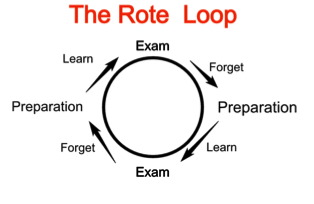During the latter part of middle school and the start of high school, many bright students start to struggle with test taking. So why has testing become so challenging? If you have studied the review packet for hours, or have re-read the passages over and over, then you probably do not have a conceptual understanding—an ability to find the main idea within text. Over the last 35 years, I have found that many intelligent students are rote memorizers, where they learn based on repetition. They have high motivation, but need to consistently reread and review information to learn for the test. However, memorizing the words does not mean that students learned and understood the information, which is the basis for testing.
Rereading and reviewing over and over also results in longer studying time. A typical motivated rote memorizer may perform well on homework and quizzes, but will have very different score for their mid-term, final-exam, or, standardized-test scores.
Your Brain Runs Out of Memory
Many rote learners possess a vast memory-storage system. However, when reading a massive amount of textual information, the brain runs out of storage and can no longer retain it. Because rote learners are prone to memorize by repetition, the outcome is that much information is lost shortly after a test. This is because a most rote learning is stored in the brain’s short-term memory bank.
By using cognitive processing—utilizing specific working memory techniques for conceptualization, students learn for long-term memory retention. Working memory is a process that uses various reasoning skills to learn. While rote memorizers use words to study, in contrast, cognitive processors access their working memory, which allows for the manipulation of stored pictures that retains information for a lifetime of knowledge.
Use Your Working Memory

Innate, strong readers use their working memory for learning both inside and outside the classroom. These are the students who have superior grades and tell fellow classmates that they “didn’t study.” In fact, they did not study because they were learning as they were reading.
While rote memorizers can pass a vocabulary quiz with an “A,” a month later, much of their knowledge has disappeared. Many rote memorizers are also not cognizant of their test performance until the test is returned. Some get their exam score back and think, “I studied so hard and thought that I knew the information inside and out.” I also hear parents say, “I tested my child and he knew the information. He is just a bad test taker.”
Image source: https://medium.com/@kriteeshparashar/rote-learning-is-not-bad-overdose-is-5c5156f1ea2c
It’s not their fault: Working memory and reasoning skills are often neglected in education programs. Students are not taught how to comprehend the textual materials given to them in the classroom, which is why they fall victim to the rote memory study habit spiral. Even the most motivated and hardworking students are susceptible to rote memorization because they were not taught how to seek conceptual understanding.
There’s No Such Thing as a Bad Test Taker
If your student comes home with A+ homework and is failing some tests, they a most likely a victim of rote memorization, and will benefit immensely from learning how to seek conceptual understanding. Learning this will eliminate study time, achieve high test scores, and assures students future academic success.
**RTS Success® focuses on teaching students reading comprehension strategies, including conceptual understanding, not only for test taking efficiency, but also for a lifetime of academic success. Please feel free to reach out with any questions to Cindy@RTSsuccess.com

